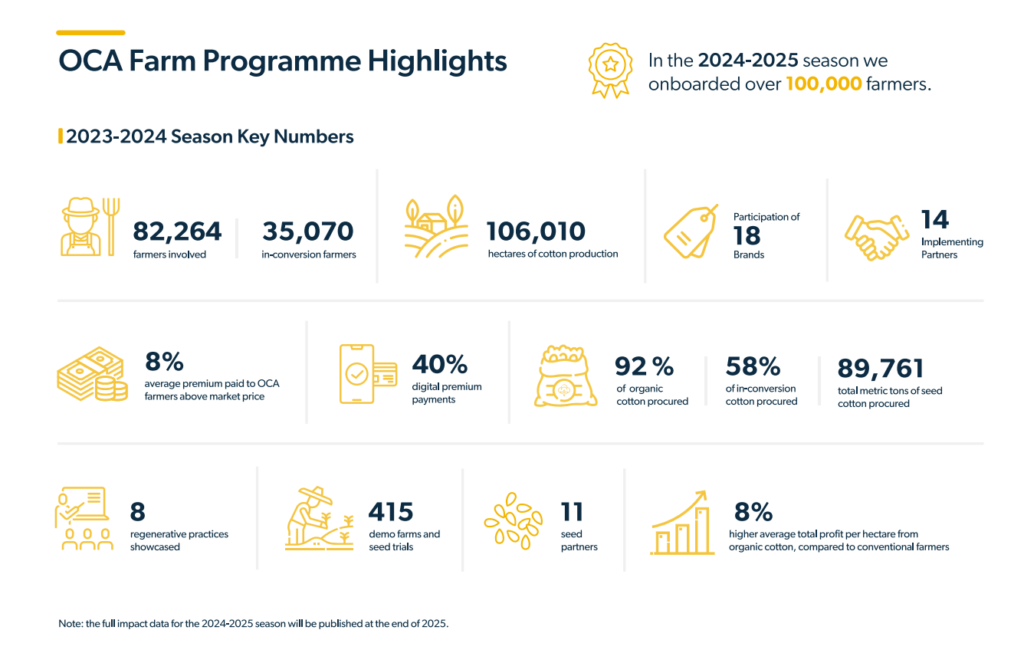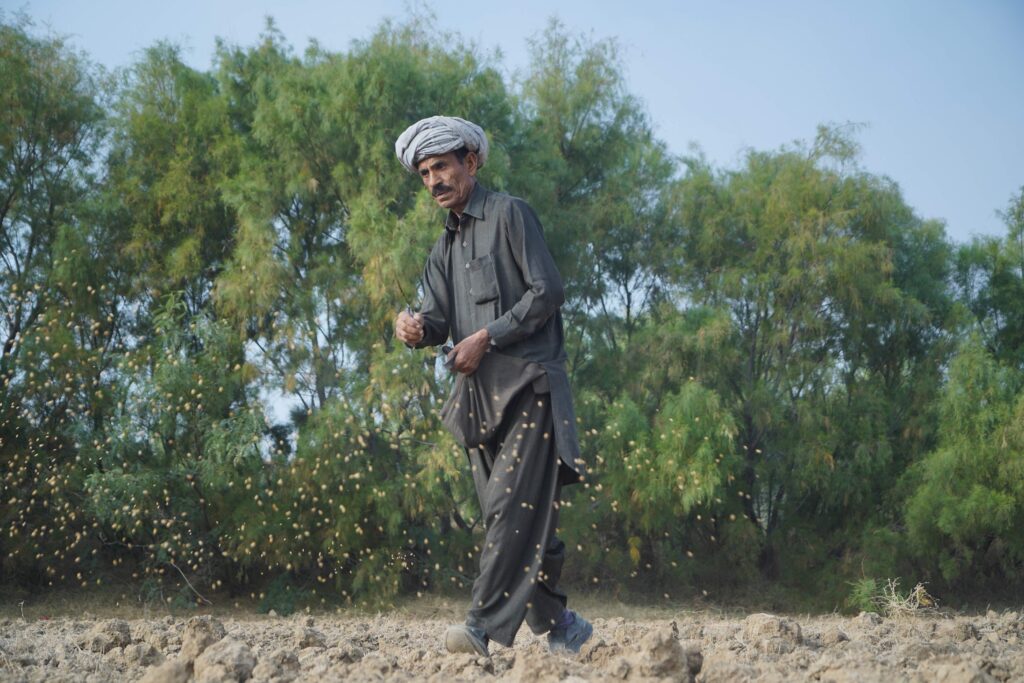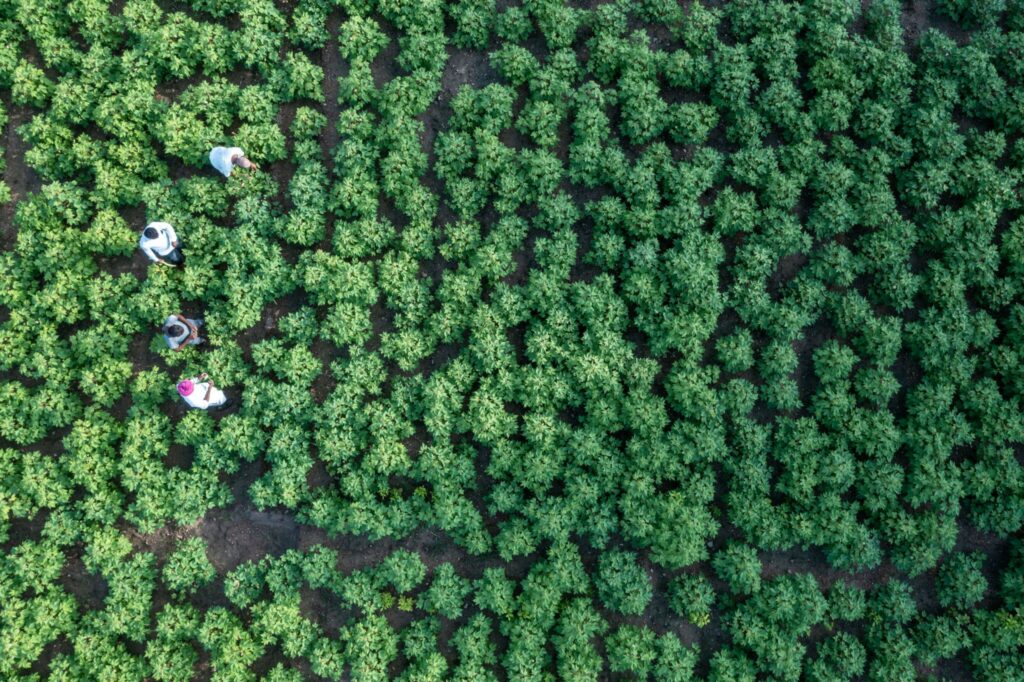The 2024-2025 cotton season marks a significant milestone for the Organic Cotton Accelerator (OCA), with over 100,000 farmers now part of our Farm Programme, a vital step toward scaling organic cotton globally.
This growth builds on the 2023-2024 season, during which OCA worked with 82,264 farmers in India and Pakistan, including 35,070 in-conversion farmers, across 106,010 hectares. These farmers earned, on average, an 8% premium above market price—a meaningful incentive for their commitment to organic.
OCA’s Farm Programme expanded to include 18 brands, 14 Implementing Partners, and 11 Seed Partners. By the season’s end, participating brands had procured 92% of the available organic cotton produced at a higher price. At the same time, only 58% of in-conversion cotton was purchased against premium prices, highlighting the need for greater industry support. In-conversion farmers are key to building a reliable organic supply chain, and their efforts require stronger backing.

Regenerative practices and environmental impact
Recognising that regenerative and organic farming practices go hand in hand, OCA continued to invest in training farmers in organic and regenerative practices, supported by a network of 415 demonstration farms.
Additionally, during the 2023-2024 season, OCA expanded the data collection systems to include environmental data, such as climate indicators and water use. This work ensures that OCA’s interventions are guided by robust data, enabling continuous improvement and measurable impact.
″Data is not just about measurement—it’s about empowering farmers, informing industry action, and driving continuous improvement. As we refine our methodologies and collaborate with key stakeholders, we aim to ensure that organic cotton farming is recognised not only for its environmental benefits but also for its positive impact on farmer livelihoods.″
The power of crop diversification
A key insight from last season: diversified cropping systems significantly boost profitability. OCA introduced additional metrics to assess total farm income, including rotational, border, cover, and intercrops.
Crop diversification is known to improve soil fertility, reduce nutrient depletion and erosion, minimising the need for costly soil regeneration treatments. For instance, crops that improve water retention, reduce irrigation costs and make farms more efficient overall.
Our data shows that during the 2023-2024 season OCA farmers earned an average total profit of €2,110 per hectare from organic cotton, 8.2% higher than conventional farmers.
“By calculating the profits from crop diversification, we confirmed that it is a cost-effective approach that strengthens both economic resilience and sustainability,” said Schute. “Building on these insights, we have increased training efforts in the new season to support farmers in implementing crop diversification practices.”
Strategic launch in Türkiye
In June 2024, OCA launched its programme in Türkiye, the world’s second-largest organic cotton producer. Focusing initially on the cotton-rich regions of South-Eastern Anatolia and the Aegean Region, OCA adapted its methodologies to local farming practices and economic contexts. In this first year, OCA focused on five projects involving 78 farmers, supported by upfront procurement agreements and premium payments, enhancing both farmer livelihoods and global visibility of Turkish organic cotton.
Advancing digital payments
OCA facilitated over €4,760,000 in premium payments during the 2023-2024 season- a 12% rise from the previous year. Digital payments accounted for 40% of transactions, improving transparency, efficiency, and farmer financial empowerment.
Expanding digital payments for farmers remains a key priority for OCA. Digital payments allow faster, direct payments, improved financial management, enabling farmers to access subsidies and loans, and better payment traceability and transparency.
Looking ahead
“Farmers are the backbone of the cotton supply chain and the true stewards of the land,” Schute emphasised. “Their commitment to sustainable practices is driving real environmental and social change, but they cannot do it alone. We have the data demonstrating our collective impact. We encourage the industry to step up and invest more in the people at the heart of the supply chain. True sustainability starts at the farm, and meaningful action must follow.”
By investing in organic cotton through OCA, brands and partners are not only supporting farming communities—they are driving systemic change.
“We invite businesses and industry leaders to partner with OCA, securing their future organic cotton supply, achieving measurable sustainability goals, and driving lasting economic and social impact.”
Explore partnership opportunities
Join OCANote: At the date of this article’s publication, OCA is still collecting and verifying complete data for the ongoing 2024-2025 cotton season. Finalised data and analysis will be available by the end of 2025.



